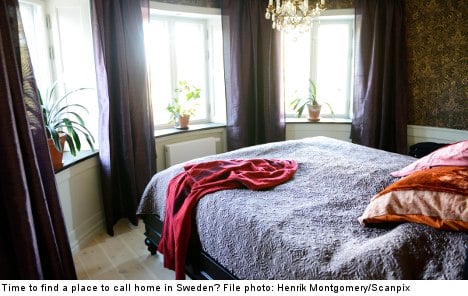Sweden's still-heavily regulated rental market was designed for another era, one where cities like Stockholm did not have to attract foreign talent to keep afloat in the globalized market place. Getting a first-hand rental contract (hyresrätt) is impossible unless you turn to the black market, which many do despite no offer of any legal protection whatsoever.
The legal rental market is notoriously difficult to enter and despite recent changes the sub-letting laws, it remains tough to find an apartment that you can count on keeping for any length of time.
RELATED: Top home buying tips for expats in Sweden
When Helena Wiseman moved from England back to her native Sweden with her Australian husband Andrew, the couple was delighted to find their bank in Sweden had an international wing to help them relocate.
“We were thrilled to find that they now had a whole section set up to help returning ex-pats,” Helena tells The Local. “Finally someone I could talk to, who understood the challenges and assured us that it would be no trouble to arrange a mortgage.”
SEE ALSO: Find your next home with The Local's Rentals Section
The couple were told to get a deposit in order, and given advice on what documentation they should take back to Sweden with them to make the transition smoother. The seemingly smooth sailing, however, proved to be an illusion once they set foot on Swedish soil.
“Once we finally found our dream home, it was a nightmare. Even though we were able to raise a 35 percent deposit the bank would not lend to us unless my father agreed to guarantee the loan,” Helena, who is in her forties, recalls.
“We were devastated. It is somewhat humiliating at our stage in life, to be forced to turn, cap in hand, to your parents in order to move back to Sweden.”
SEE ALSO: Check out the latest home listings in The Local's Property Section
While renting at first is almost a must, the entire property hunt can be particularly taxing for families. Relocation agents are able to find properties, but stability remains an issue. Many families find that they need to move home at least once during a two-year contract in Sweden because to the families they have rented from return unexpectedly.
Certain foreign companies with Stockholm offices even make a point of mentioning the rental market hell to any staff eyeing a vacancy in the Swedish office.
With politicians concerned that the housing market is cramping Stockholm’s ability to expand and attract foreign expertise, many professionals contemplating a move to the Swedish capital consider buying instead.
But how easy is it as a newly arrived ex-pat or even a returning native, to secure a loan without a longstanding credit history here?
SEE ALSO: Get the latest exchange rates and transfer money on The Local's Currency page
“We welcome ex-pat customers,” Danske Bank spokesman Stefan Frodig tells The Local, but added that opening a checking account and securing credit were miles apart.
“In theory, the bank holds the property as security but the last thing we want is to be left with the house, we want to be sure that our customers can make their payments and remain in their homes,” he says.
SEE ALSO: Click here for the latest listings for jobs in Sweden
In the wake of the sub-prime lending scandal, and with tougher regulations to prevent money-laundering, banks are pretty tied when it comes to how much risk they can take.
With little or no credit history in Sweden, a foreign professional must find other ways to prove their credit clout.
While every situation is different, and banks are reluctant to make blanket statements about foreigners' chances of securing a mortgage, The Local has nevertheless compiled a list of seven tips for foreigners looking to buy a home in Sweden.
Tara Sonnorp




 Please whitelist us to continue reading.
Please whitelist us to continue reading.
Member comments